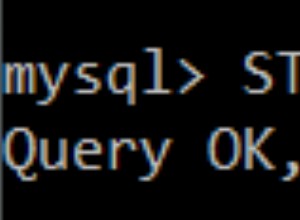J'ai fait quelques expériences sur ce que vous m'avez dit et j'avais pensé le partager comme réponse.
Je crée d'abord quelques tables de test :
CREATE TABLE foo (
foo_id int(10) unsigned NOT NULL,
PRIMARY KEY (foo_id)
)
ENGINE=InnoDB DEFAULT CHARSET=utf8 COLLATE=utf8_spanish_ci;
CREATE TABLE bar (
bar_id int(10) unsigned NOT NULL,
PRIMARY KEY (bar_id)
)
ENGINE=InnoDB DEFAULT CHARSET=utf8 COLLATE=utf8_spanish_ci;
CREATE TABLE foo_bar (
foo_id int(10) unsigned NOT NULL,
bar_id int(10) unsigned NOT NULL
)
ENGINE=InnoDB DEFAULT CHARSET=utf8 COLLATE=utf8_spanish_ci;
Jusqu'à présent, aucun index n'existe :
mysql> SHOW INDEXES FROM foo_bar;
Empty set (0.00 sec)
L'ajout d'une clé primaire génère un index :
mysql> ALTER TABLE foo_bar
-> ADD PRIMARY KEY (`foo_id`, `bar_id`);
Query OK, 0 rows affected (0.70 sec)
Records: 0 Duplicates: 0 Warnings: 0
mysql> SHOW INDEXES FROM foo_bar;
+---------+------------+----------+--------------+-------------+-----------+-------------+----------+--------+------+------------+---------+
| Table | Non_unique | Key_name | Seq_in_index | Column_name | Collation | Cardinality | Sub_part | Packed | Null | Index_type | Comment |
+---------+------------+----------+--------------+-------------+-----------+-------------+----------+--------+------+------------+---------+
| foo_bar | 0 | PRIMARY | 1 | foo_id | A | 0 | NULL | NULL | | BTREE | |
| foo_bar | 0 | PRIMARY | 2 | bar_id | A | 0 | NULL | NULL | | BTREE | |
+---------+------------+----------+--------------+-------------+-----------+-------------+----------+--------+------+------------+---------+
2 rows in set (0.02 sec)
Si j'ajoute une clé étrangère sur foo_id il réutilise l'index de la clé primaire puisque cette colonne est la première de l'index :
mysql> ALTER TABLE foo_bar
-> ADD CONSTRAINT `foo_bar_fk1` FOREIGN KEY (`foo_id`) REFERENCES `foo` (`foo_id`) ON DELETE CASCADE ON UPDATE CASCADE;
Query OK, 0 rows affected (0.27 sec)
Records: 0 Duplicates: 0 Warnings: 0
mysql> SHOW INDEXES FROM foo_bar;
+---------+------------+----------+--------------+-------------+-----------+-------------+----------+--------+------+------------+---------+
| Table | Non_unique | Key_name | Seq_in_index | Column_name | Collation | Cardinality | Sub_part | Packed | Null | Index_type | Comment |
+---------+------------+----------+--------------+-------------+-----------+-------------+----------+--------+------+------------+---------+
| foo_bar | 0 | PRIMARY | 1 | foo_id | A | 0 | NULL | NULL | | BTREE | |
| foo_bar | 0 | PRIMARY | 2 | bar_id | A | 0 | NULL | NULL | | BTREE | |
+---------+------------+----------+--------------+-------------+-----------+-------------+----------+--------+------+------------+---------+
2 rows in set (0.00 sec)
Si j'ajoute une clé étrangère sur bar_id , il crée un index car aucun index existant ne peut être réutilisé :
mysql> ALTER TABLE foo_bar
-> ADD CONSTRAINT `foo_bar_fk2` FOREIGN KEY (`bar_id`) REFERENCES `bar` (`bar_id`) ON DELETE CASCADE ON UPDATE CASCADE;
Query OK, 0 rows affected (0.25 sec)
Records: 0 Duplicates: 0 Warnings: 0
mysql> SHOW INDEXES FROM foo_bar;
+---------+------------+-------------+--------------+-------------+-----------+-------------+----------+--------+------+------------+---------+
| Table | Non_unique | Key_name | Seq_in_index | Column_name | Collation | Cardinality | Sub_part | Packed | Null | Index_type | Comment |
+---------+------------+-------------+--------------+-------------+-----------+-------------+----------+--------+------+------------+---------+
| foo_bar | 0 | PRIMARY | 1 | foo_id | A | 0 | NULL | NULL | | BTREE | |
| foo_bar | 0 | PRIMARY | 2 | bar_id | A | 0 | NULL | NULL | | BTREE | |
| foo_bar | 1 | foo_bar_fk2 | 1 | bar_id | A | 0 | NULL | NULL | | BTREE | |
+---------+------------+-------------+--------------+-------------+-----------+-------------+----------+--------+------+------------+---------+
3 rows in set (0.02 sec)
L'une de nos clés étrangères utilise l'index de clé primaire. Cela signifie que nous ne pouvons pas supprimer un tel index !
mysql> ALTER TABLE foo_bar
-> DROP PRIMARY KEY;
ERROR 1025 (HY000): Error on rename of '.\test\#sql-568_c7d' to '.\test\foo_bar' (errno: 150)
Sauf si nous créons un index pour la clé étrangère ou si nous supprimons la clé elle-même :
mysql> ALTER TABLE foo_bar
-> DROP FOREIGN KEY `foo_bar_fk1`;
Query OK, 0 rows affected (0.19 sec)
Records: 0 Duplicates: 0 Warnings: 0
mysql> ALTER TABLE foo_bar
-> DROP PRIMARY KEY;
Query OK, 0 rows affected (0.23 sec)
Records: 0 Duplicates: 0 Warnings: 0
La conclusion est que MySQL crée automatiquement des index lorsqu'ils sont requis pour une fonctionnalité (mais seulement s'ils sont strictement nécessaires).




